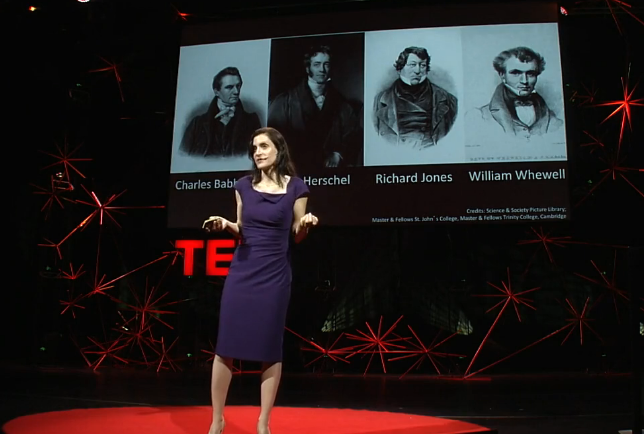I first found out about this confrontation when I was in graduate school, and it kind of blew me away.
我第一次聽說這個故事的時候還在念研究生,這個故事讓我太驚訝了。
I mean, how could the word scientist not have existed until 1833?
我是說“科學家”這個詞怎么可能是1833年才出現的?
What were scientists called before?
在那之前科學家們如何稱呼自己?
What had changed to make a new name necessary precisely at that moment?
在那個年代,創造一個新的名字帶來了什么改變?
Prior to this meeting, those who studied the natural world were talented amateurs.
在這次會議之前,研究自然世界的人都是一些很有天賦的愛好者。
Think of the country clergyman or squire collecting his beetles or fossils,
他們會是鎮上的牧師或鄉紳,熱衷于收集甲蟲或化石標本,
like Charles Darwin, for example, or, the hired help of a nobleman, like Joseph Priestley,
比如達爾文,又如發現了氧氣的約瑟夫·普利斯特里,
who was the literary companion to the Marquis of Lansdowne when he discovered oxygen.
他當時是蘭斯頓侯爵的陪讀。

After this, they were scientists,
在那之后,他們都成為了科學家,
professionals with a particular scientific method, goals, societies and funding.
有特定的研究方法、目標、團體和資金支持的專業研究人員。
Much of this revolution can be traced to four men who met at Cambridge University in 1812:
許多革新都可以追溯到1812年在劍橋大學聚會的四個人:
Charles Babbage, John Herschel, Richard Jones and William Whewell.
查爾斯·巴貝奇,約翰·赫歇爾,理查德·瓊斯和威廉姆·胡威立.
These were brilliant, driven men who accomplished amazing things.
這四位領軍人物都非常智慧并且成果頗豐。
Charles Babbage, I think known to most TEDsters,
我想大多數TED聽眾都知道查爾斯·巴貝奇
invented the first mechanical calculator and the first prototype of a modern computer.
他發明了第一臺機械計算機以及第一代計算機的原型。
John Herschel mapped the stars of the southern hemisphere,
約翰·赫歇爾制作了南半球的星圖,
and, in his spare time, co-invented photography.
并且在他的業余時間與他人共同發明了照相技術。
I'm sure we could all be that productive without Facebook or Twitter to take up our time.
我相信如果我們戒掉臉書和推特,我們也能這么高產的。











